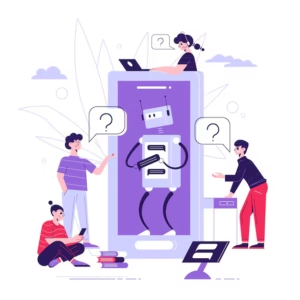Introduction
Imagine a world in which your applications anticipate user demands before they are even launched, your website creates itself, and engineers work with AI to create software at breakneck speed. Greetings from 2025, the year that artificial intelligence (AI) transforms the way we design, develop, and use digital platforms.
In addition to discussing what AI is capable of, this essay offers a useful roadmap for how AI will transform website and app development by 2025. You’ll learn practical ways to apply AI for more efficient workflows, cleverer designs, and exceptional user experiences, regardless of your level of expertise as a developer, company founder, or tech enthusiast. Let’s explore the future.
Section 1: AI in 2025—The Game-Changer for Developers*
*Why AI is No Longer Optional
By 2025, artificial intelligence will be the foundation of progress rather than only a “tool.” By 2025, 70% of professional developers will utilize AI-powered platforms on a regular basis, cutting project timeframes by as much as 40%, predicts Gartner. This is the reason:
Automated Coding Assistants: Programs such as Amazon CodeWhisperer and GitHub Copilot are already generating code fragments. They will manage whole modules by 2025.
AI will examine user behavior to create layouts that optimize engagement through *Predictive Design*.
Real-Time Bug Squashing: AI will identify and address issues before they cause your app to fail.
Case Study: Airbnb reduces design iteration time by 50% by using AI to automatically produce design prototypes based on user data.
Section 2: AI Website Development in 2025—Building Smarter, Faster
Step 1: AI-Driven Design Tools
Custom websites may be made in a matter of minutes using platforms like as Wix ADI and Bookmark’s AIDA. In 2025, anticipate:
Personalization at Scale: AI will use real-time data (such as location and browsing history) to customize webpages for each unique visitor.
SEO Autopilot: Content will be automatically optimized for rankings by tools such as Surfer SEO, which will interface directly with CMS platforms.
Step 2: Dynamic Content Generation
AI writers such as Copy.ai and Jasper will develop to create product descriptions, blog posts, and even video scripts that are consistent with your brand voice.
Step 3: Optimizing Voice and Visual Search
By 2025, 55% of households are anticipated to have smart speakers, and AI will optimize websites for image-based and voice search queries.
Pro Tip: Use tools like Figma’s AI plugin to auto-generate wireframes from a text prompt.

Section 3: AI App Development in 2025—From Concept to Launch in Record Time
Trend 1: No-Code/Low-Code Platforms
AI will be used by platforms like as Bubble and Adalo to transform flowcharts into useful applications. In only a few hours, even non-developers can create MVP apps.
Trend 2: AI-Powered User Testing
To find UX issues before to launch, technologies such as Applitools and Testim.io will replicate millions of user interactions.
Trend 3: Hyper-Personalized Apps
The recommendation engine on Netflix is only the beginning. By 2025, applications will modify their features and interfaces in response to biometric information (e.g., heart rate, mood).
Actionable Insight: Use OpenAI’s GPT-5 (expected to be released) to create apps that can organically communicate with people and manage customer service or content production.
Section 4: Ethical AI Development—Building Trust in 2025
Concerns of prejudice, privacy, and transparency are growing along with AI. Keep ahead of the game by:
- Explainable AI (XAI): Programs such as IBM’s Watson OpenScale guarantee that algorithms provide intelligible results.
- Bias Mitigation: Audit datasets for skewed results using tools like Fairlearn.
- GDPR Compliance: OneTrust and other AI solutions automatically update apps to comply with changing requirements.
- Stat: according to Cisco (2023), 84% of users said they will stop using apps that don’t secure their data.

FAQs: Your AI Development Questions Answered
Q1: Will app developers be replaced by AI?
A: No, AI is a partner rather than a rival. It manages monotonous work, allowing developers to concentrate on creativity.
Q2: What is the price of developing an AI app?
A: No-code platforms start at $50 per month, however prices vary. Depending on complexity, custom AI integrations might cost anywhere from $20,000 to $100,000+.
Q3: Which AI tool is best for novices?
A: Try Canva’s Magic Design for AI-generated graphics or Google’s AutoML for simple model training.
Q4: Is it SEO-friendly to design websites using AI?
A: Indeed! AI is used by tools like HubSpot’s SEO Suggestions to make sure your website ranks highly.

Conclusion
AI will be the norm for developing competitive, user-focused apps and websites by 2025, not simply a fad. The secret is to carefully integrate AI, combining its potential with human innovation, for anything from automated coding to ethical protections.
Are you prepared to make your development process future-proof? Stay ahead of the curve by experimenting with AI technologies now.
For more Detail


